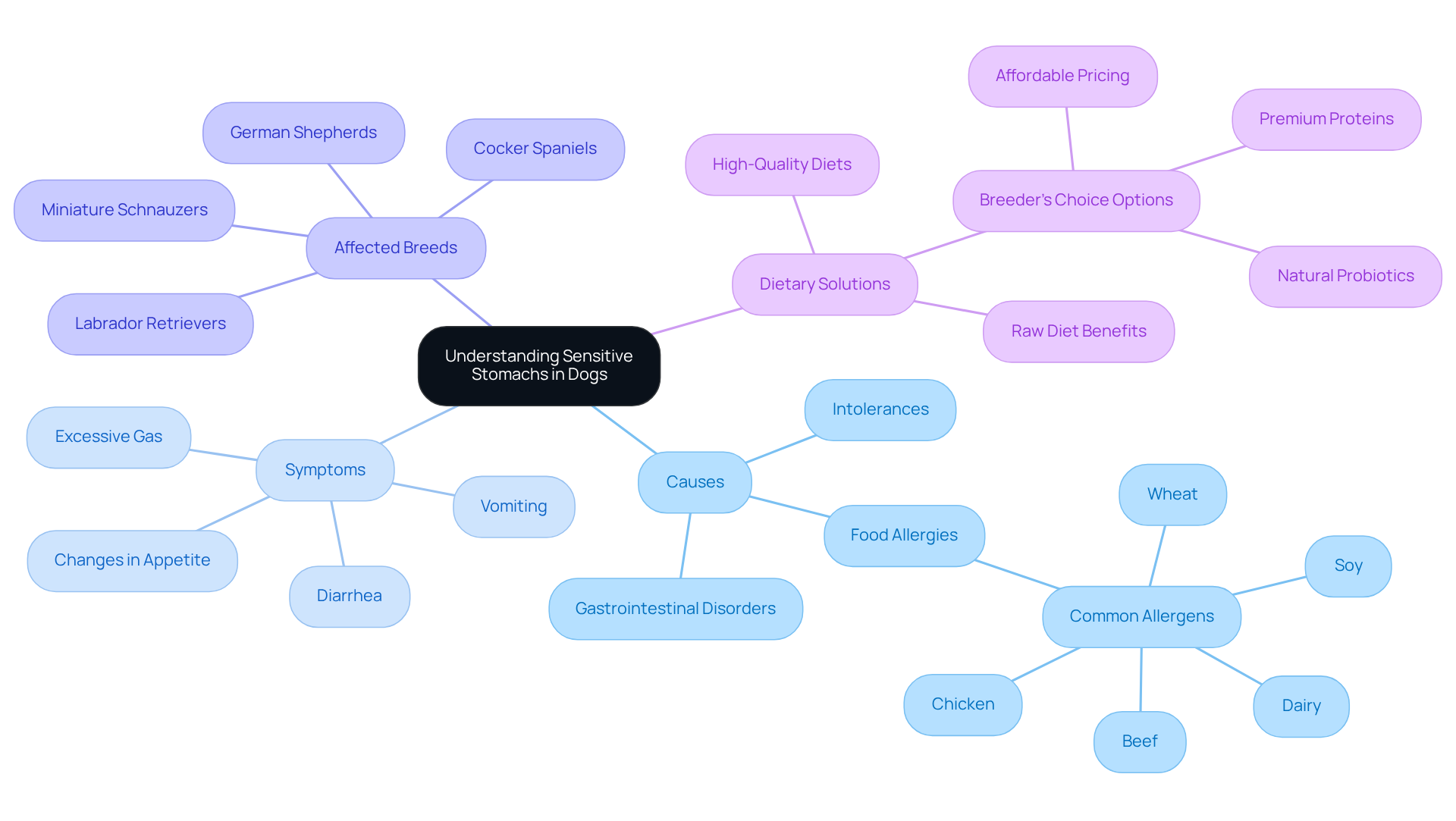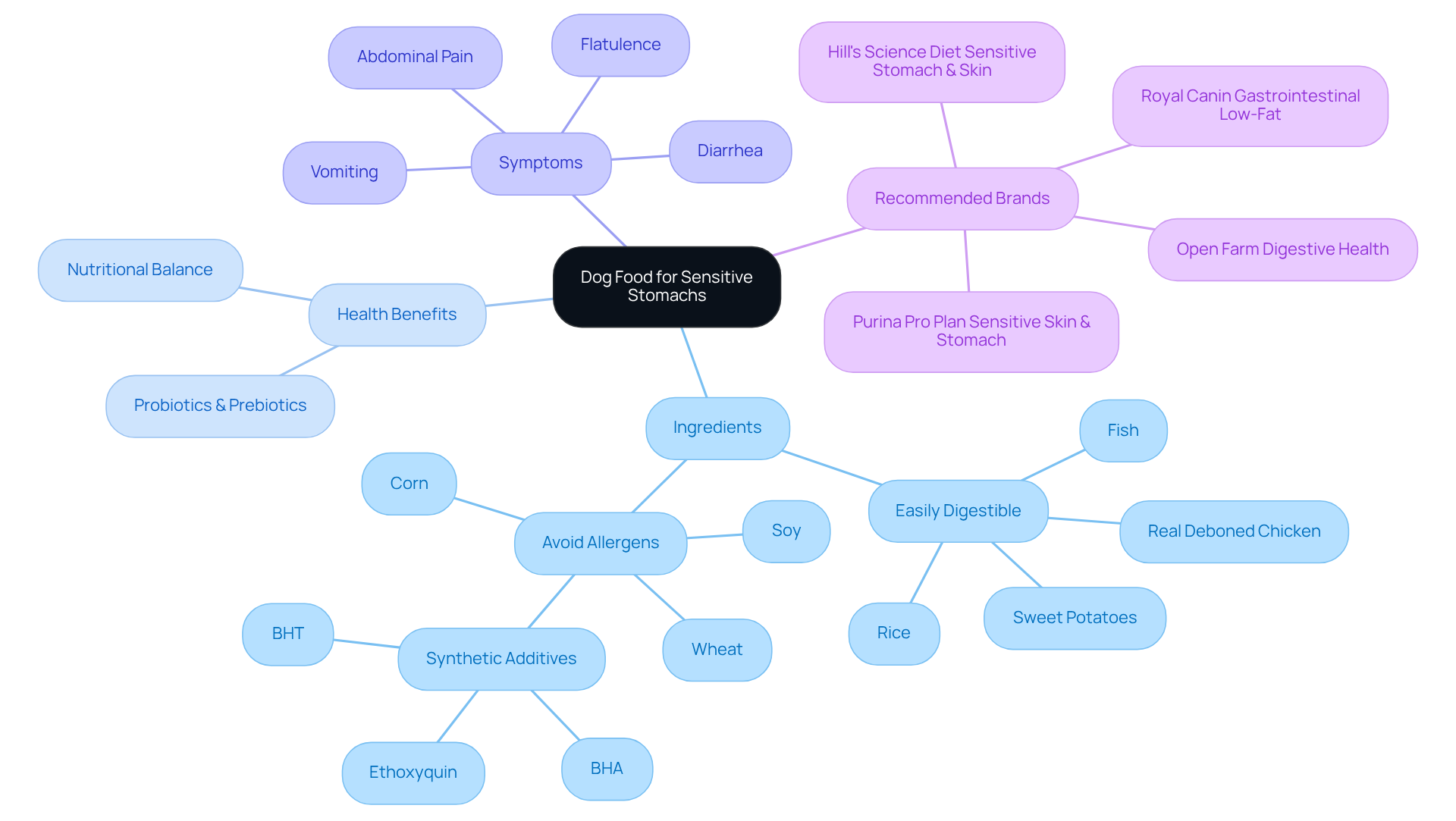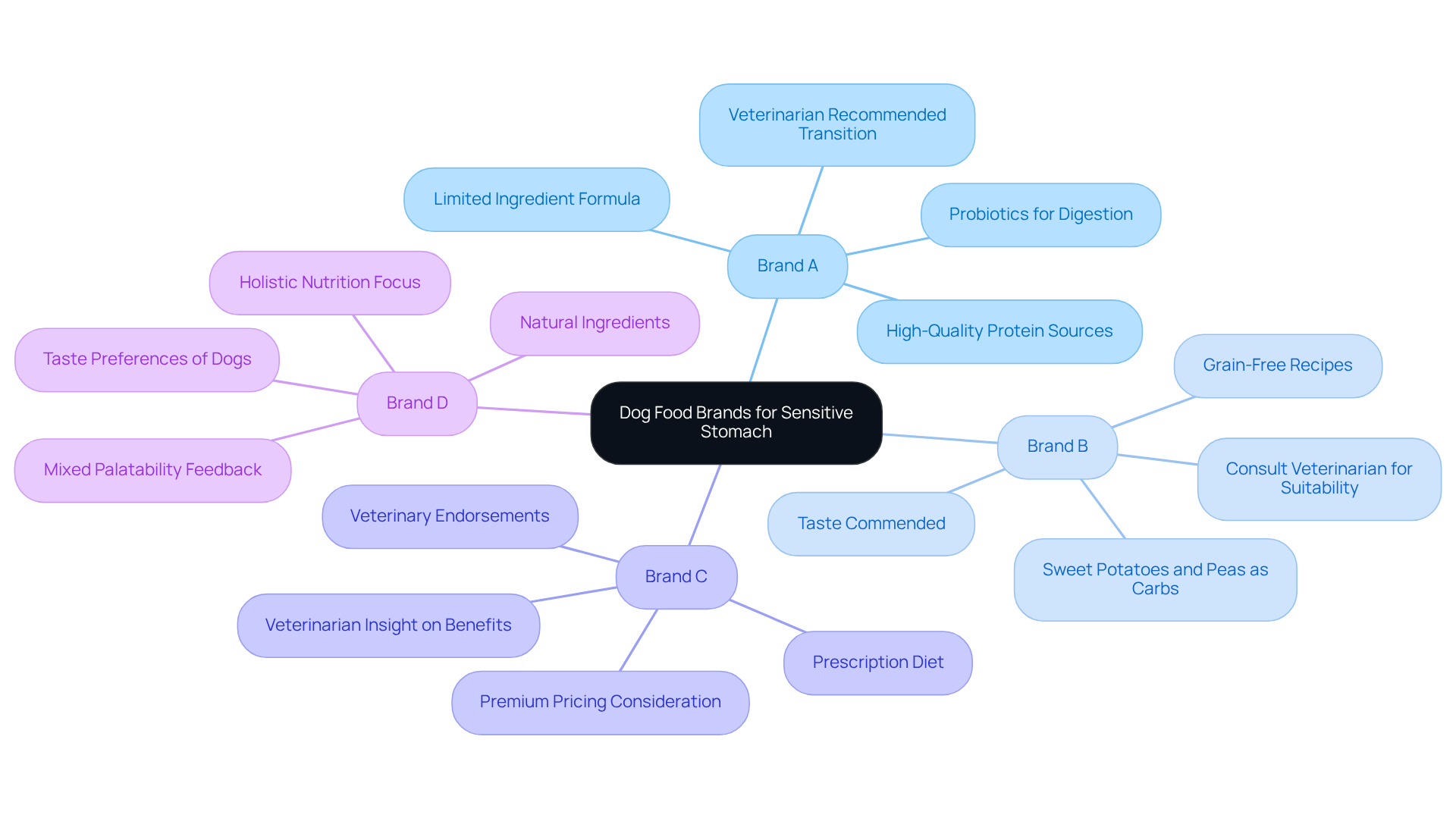Best Dog Food for Sensitive Stomach: Compare Top Brands
Overview
Finding the best dog food for your furry family members with sensitive stomachs can be a challenge. It’s essential to choose brands that prioritize easily digestible ingredients, such as high-quality proteins and probiotics, while steering clear of common allergens. Brands like Hill’s Science Diet and Purina Pro Plan stand out for their focus on digestibility and nutritional balance.
Remember, making gradual dietary transitions is crucial to prevent gastrointestinal distress in your beloved pets. By taking these steps, you can create a nurturing environment that supports their health and happiness.
Introduction
Sensitive stomachs in dogs are more common than many pet owners realize. In fact, approximately 20% of our furry family members experience gastrointestinal issues at some point in their lives. This condition can lead to discomfort and distress, often manifesting in symptoms like vomiting and diarrhea, which can significantly impact a dog’s quality of life.
In this article, we explore the best dog food options specifically designed for sensitive stomachs. We highlight key ingredients and brands that promote digestive health, ensuring your beloved pet can thrive. However, with so many choices available, how can you determine which food truly meets your dog’s unique needs and alleviates their digestive troubles? Let’s embark on this journey together to find the right solution for your pet’s comfort and happiness.
Understanding Sensitive Stomachs in Dogs
Sensitive stomachs in our furry family members can arise from various factors, including food allergies, intolerances, and gastrointestinal disorders. Recent statistics reveal that around 20% of canines experience gastrointestinal issues at some point in their lives, underscoring the prevalence of this concern among pet owners. Common symptoms such as vomiting, diarrhea, excessive gas, and changes in appetite can significantly affect a dog’s quality of life. For instance, many dogs, particularly breeds like:
- German Shepherds
- Labrador Retrievers
- Miniature Schnauzers
- Cocker Spaniels
may develop sensitivities due to sudden dietary changes or exposure to common allergens like beef, chicken, wheat, soy, and dairy.
Veterinarians emphasize the importance of recognizing these symptoms early. Dr. Rebecca MacMillan, a compassionate veterinary surgeon, reminds us that “it’s crucial to ensure there are no underlying causes for your dog’s tummy troubles, so get him checked out by a vet.” This proactive approach not only leads to timely interventions but also dietary adjustments that can alleviate discomfort for our beloved pets.
Choosing the best dog food for sensitive stomach is essential for managing a sensitive stomach. High-quality, digestible diets, such as the best dog food for sensitive stomach, which contain natural probiotics and premium proteins, can promote digestive health and reduce gastrointestinal distress. For example, transitioning to a raw diet with components like chicken and beef tripe has shown beneficial outcomes in enhancing gut health and overall vitality in canines. Furthermore, Breeder’s Choice raw dog meal offers an economical alternative without sacrificing quality, making it a fitting selection for pet caregivers seeking effective dietary solutions. By understanding the signs of a sensitive stomach and making informed dietary choices, pet owners can enhance their dogs’ well-being and ensure a happier, healthier life.

Key Features of Dog Food for Sensitive Stomachs
When it comes to your furry family members with sensitive stomachs, choosing the best dog food for sensitive stomach is crucial for their nutrition. Nutrition for dogs with delicate tummies is best achieved through the best dog food for sensitive stomach, which focuses on easily digestible ingredients like rice, sweet potatoes, and specific protein sources such as real deboned chicken or fish. These thoughtful formulations typically avoid common allergens, including corn, wheat, soy, and synthetic additives like BHA, BHT, and ethoxyquin, which can exacerbate gastrointestinal issues. A key feature of these diets is the inclusion of probiotics and prebiotics, essential for maintaining gut health and improving digestion. Probiotics help balance gut bacteria, reducing discomfort and enhancing nutrient absorption.
It’s also vital to ensure that these foods provide a nutritional balance, supplying essential nutrients without overwhelming the gastrointestinal system. Brands like Hill’s Science Diet Sensitive Stomach & Skin and Purina Pro Plan Sensitive Skin & Stomach are among the best dog food for sensitive stomachs, thanks to their easily digestible ingredients and probiotic content, making them excellent choices for dogs with sensitive stomachs. Additionally, Royal Canin Gastrointestinal Low-Fat is specifically crafted to promote intestinal health while minimizing fat content, which can lead to gastrointestinal upset.
As pet caregivers, it’s important to recognize the symptoms of a sensitive stomach, which may manifest as vomiting, diarrhea, and flatulence. Understanding these signs is crucial for pet guardians who wish to alleviate their dog’s digestive issues while providing a balanced and nutritious diet. By selecting premium canine nutrition that emphasizes digestibility and digestive health, and by gradually transitioning to new food over 7-10 days, you can significantly enhance your pets’ overall well-being. Remember, your love and attention to their dietary needs create a nurturing environment for your beloved companions.

Comparative Analysis of Top Dog Food Brands
When considering the best dog food for sensitive stomach, it’s important to acknowledge the concerns of pet owners seeking the best for their furry family members. Several notable options stand out:
-
Brand A: Renowned for its limited ingredient formula, Brand A prioritizes high-quality protein sources while avoiding common allergens. Its inclusion of probiotics aids in digestion, making it one of the best dog food for sensitive stomach, favored by pet owners looking to ease their pets’ stomach problems. Veterinarians frequently suggest a gradual shift to this food over 7-10 days to avoid stomach discomfort.
-
Brand B: This brand specializes in grain-free recipes, utilizing sweet potatoes and peas as primary carbohydrate sources. While it is commended for its taste, some canines may still encounter digestive difficulties due to the increased protein content. Consulting with a veterinarian can help determine if this brand is the best dog food for sensitive stomach for your dog’s specific needs.
-
Brand C: With strong veterinary endorsements, Brand C provides a prescription diet designed for canines with gastrointestinal sensitivities. Although it is frequently advised by veterinarians, its premium pricing may be a factor for some pet guardians. A veterinarian’s insight can help assess whether the benefits justify the cost.
-
Brand D: Emphasizing natural ingredients and holistic nutrition, Brand D appeals to those who prioritize organic options. However, some dogs may find this brand less appealing in terms of taste compared to others. Feedback from dog owners indicates mixed results regarding palatability, which is an important factor to consider.
Ultimately, each brand presents unique advantages and potential drawbacks. The ideal choice will depend on the specific needs, preferences, and dietary restrictions of each dog. Consulting with a veterinarian can provide valuable guidance in selecting the most appropriate food for your furry companion, ensuring a nurturing environment for their well-being.

Conclusion
Caring for dogs with sensitive stomachs is crucial for every pet owner. The right dog food can truly alleviate discomfort and enhance overall health. By prioritizing high-quality, digestible ingredients and being aware of common allergens, you can provide your furry family members with the nutrition they need to thrive.
Recognizing the symptoms of a sensitive stomach, such as vomiting and diarrhea, is essential. This article emphasizes the importance of a thoughtful approach to dietary choices. It discusses various top brands specifically designed for dogs with sensitive stomachs, detailing their unique formulations and benefits, including the inclusion of probiotics and limited ingredients to minimize gastrointestinal distress. Consulting with veterinarians and gradually transitioning to new diets are also crucial for ensuring a smooth dietary adjustment.
Ultimately, the well-being of your dogs with sensitive stomachs relies on informed decisions about their nutrition. By choosing the right dog food and paying attention to their specific needs, you can significantly enhance their quality of life. This commitment to understanding and addressing dietary sensitivities not only fosters a healthier lifestyle for your pets but also strengthens the bond between you and your beloved companions.
Frequently Asked Questions
What causes sensitive stomachs in dogs?
Sensitive stomachs in dogs can arise from various factors, including food allergies, intolerances, and gastrointestinal disorders.
How common are gastrointestinal issues in dogs?
Approximately 20% of dogs experience gastrointestinal issues at some point in their lives.
What are the common symptoms of a sensitive stomach in dogs?
Common symptoms include vomiting, diarrhea, excessive gas, and changes in appetite.
Which dog breeds are more likely to develop sensitivities?
Breeds such as German Shepherds, Labrador Retrievers, Miniature Schnauzers, and Cocker Spaniels may develop sensitivities due to sudden dietary changes or exposure to common allergens.
Why is it important to recognize symptoms of a sensitive stomach early?
Recognizing symptoms early is crucial to ensure there are no underlying causes for the dog’s tummy troubles, allowing for timely interventions and dietary adjustments.
What dietary choices can help manage a sensitive stomach in dogs?
Choosing high-quality, digestible diets that contain natural probiotics and premium proteins can promote digestive health and reduce gastrointestinal distress.
What is an example of a beneficial diet for dogs with sensitive stomachs?
Transitioning to a raw diet with ingredients like chicken and beef tripe has shown beneficial outcomes in enhancing gut health and overall vitality in dogs.
What is Breeder’s Choice raw dog meal?
Breeder’s Choice raw dog meal is an economical alternative for pet caregivers seeking effective dietary solutions for dogs with sensitive stomachs without sacrificing quality.







